MercoPress. South Atlantic News Agency
Tag: Seabird
-
Tuesday, June 22nd 2021 - 09:44 UTC
Mitigating the impact of longline fisheries on seabirds: the South Georgia experience
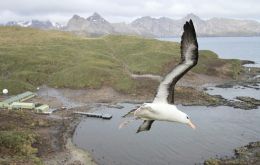
Seabird mortality in fisheries is a global problem and a major driver of the continued decline of many seabird populations. Unless appropriate mitigation is in place, longline fishing can cause high levels of seabird mortality.
-
Wednesday, July 16th 2014 - 09:19 UTC
Amazing new invention from UK business ready to save the Southern Ocean’s Albatross
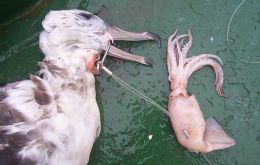
Globally, an albatross dies on a fishing hook every 5 seconds. Since working with Falklands Conservation from 1996-2005, biologist Becky Ingham has wanted to help prevent the decline of these iconic birds. The Hookpod is a clever new invention that catches fish, not birds and here Becky tells us how ot works.
-
Monday, November 21st 2011 - 23:55 UTC
UK praises Overseas Territories for sponsoring measures to protect seabirds

Foreign Office Minister Henry Bellingham has welcomed the UK Overseas Territories important role in agreeing new measures to protect seabirds.
-
Monday, June 27th 2011 - 16:17 UTC
Falklands, South Georgia success in minimizing long-line fishing seabird bycatch

A study has revealed that at least 160,000 and potentially in excess of 320,000 seabirds are killed annually in longline fisheries globally. Some previous studies have assessed the level of seabird by catching longline fisheries for particular regions and groups of seabirds, but this is the first study to provide a global estimate of by-catch of all seabirds in longline fisheries.
-
Thursday, March 24th 2011 - 06:19 UTC
The world’s rarest albatross confirmed as a separate species by scientists
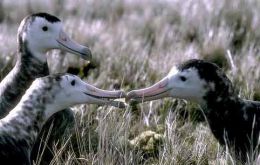
The world's rarest albatross has been confirmed as a separate species by scientists. The genetic analysis solves 20 years of debate over the status of the Amsterdam albatross.
Canadian researchers have proven that the birds' DNA varies significantly from wandering albatrosses, their closest living relatives. -
Thursday, July 29th 2010 - 05:36 UTC
UK Overseas Territories “fifth in world league table of bird extinctions”
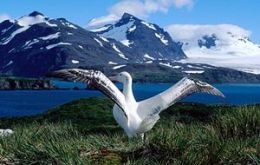
Put together the UK’s 16 Overseas Territories (including Falklands and South Georgia) are fifth in the world league table of bird extinctions, with at least ten species from the territories going to oblivion since 1500AD, partially or wholly because of the impact of non-native mammals, such as rats, feral cats, mice and pigs, according to BirdLife International site.
-
Thursday, June 3rd 2010 - 00:47 UTC
Falkland Islands approves plan to further reduce seabird deaths by trawl fishing
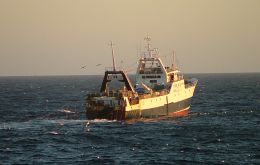
Seabird deaths caused by trawl fishing will be further reduced following the Falkland Islands Government’s approval of a new Action Plan. A ninety per cent reduction in seabird deaths was recorded in the long-line fishery the year after a similar Action Plan to introduce tori lines was put into effect in 2004. Both plans demonstrate the steps taken by the Falkland Islands to maintain their international reputation for the responsible and sustainable management of their fishing industry.
